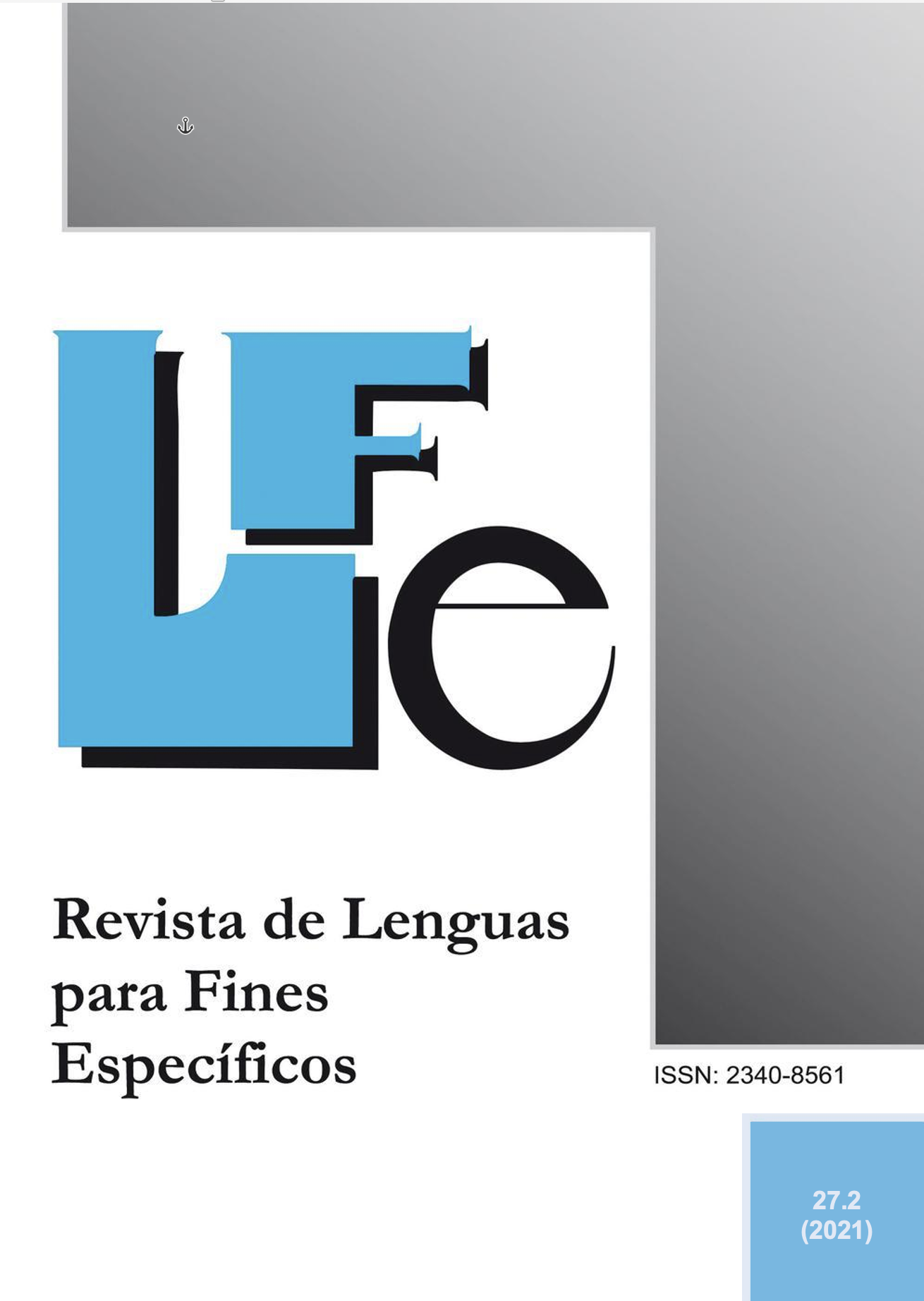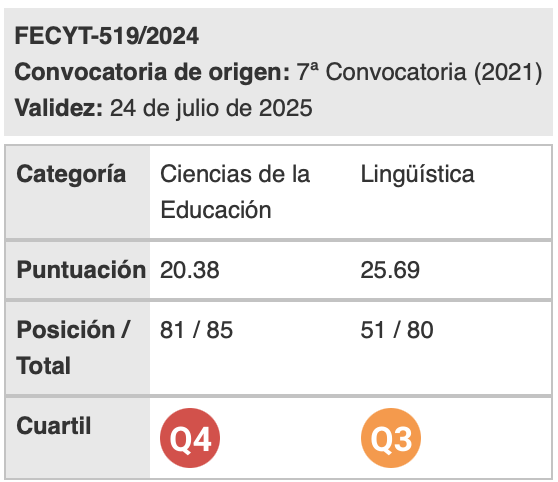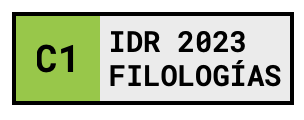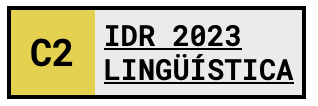An LSP Framework for Translation and Interpreting Pedagogy
Keywords:
language teaching, TILLT, LSP, translation and interpreting pedagogy, translator and interpreter trainingAbstract
In this article, we present a pedagogical framework for foreign language teaching in undergraduate translation and interpreting programmes. Within Translation Studies, many scholars support the idea that TILLT (Translation- and Interpreting-oriented Language Learning and Teaching) should be framed within the teaching of Languages for Specific Purposes (LSP), as students will use language as a professional tool in their professional lives. Based on insights from LSP research and practice, the area of Translation Studies dedicated to the development of language competence and expertise research, we have selected and described the key aspects for the development of professional language use in Translation and Interpreting pedagogy. We have then connected them in a framework to show how they interact and influence each other.
Downloads
References
Adams, H. & Cruz García, L. (2015). Towards LSP (I) – language teaching for future interpreters. In Proceedings from the V Congreso Sociedad Española de Lenguas Modernas. Sevilla: Bienza, 29-40.
Ahmann, H. & Schmidhofer, A. (2017). Translationsdidaktik 15 Jahre nach Bologna – zur Notwendigkeit einer Verringerung der Verschulung und zur Integration und Abgrenzung vom GERS in der Sprachausbildung. In E. Schwarz & U. Stachl-Peier (Eds.), Das Spiel der Sprachen 4 (pp. 9-36). Graz: Grazer Translation Studies.eng
Altuweirash, N. (2017). Deliberate Practice in Second Language Learning: A Concept whose Time has Come. International Journal of Language and Linguistics, 4(3), 111-115.
Angelelli, C. & Degueldre, C. (2002). Bridging the gap between language for general purposes and language for work: An intensive Superior-level language/skill course for teachers, translators, and interpreters. In B. Lou Leaver & B. Shekhtman (Eds.), Developing Professional-level Language Proficiency (pp. 91-110). Cambridge/New York: Cambridge University Press.
Anderson, N. (2008). Metacognition and the good language learner. In C. Griffiths (Eds.), Lessons from Good Language Learners (pp. 99-109). Cambridge: Cambridge University Press.
Baker, C. (1996). Foundations of Bilingual Education and Bilingualism (2nd Edition). Clevedon: Multilingual Matters.
Basturkmen, H. & Elder, C. (2004). The practice of LSP. In A. Davies and C. Elder (Eds.), Handbook of Applied Linguistics (pp. 672–694). Oxford: Blackwell.
Belcher, D. (2009). What ESP is and can be: An introduction. In D. Belcher (Eds.), English for Specific Purposes in Theory and Practice (pp. 1-20). Ann Arbor: University of Michigan Press.
Berenguer, L. (1997). L’ensenyament de llengües estrangeres per a traductors: Didàctica de l’alemany. PhD Dissertation. Barcelona, Universitat Autònoma de Barcelona.
Berenguer, L. (1999). Cómo preparar la traducción en la clase de lenguas extranjeras. Quaderns. Revista de traducció, 4, 135-150.
Carrasco Flores, J.A. (2017). English for Translation and Interpreting. A cognitive and methodological framework of reference for materials analysis and development. PhD Dissertation. Madrid: Universidad Complutense de Madrid.
Carrasco Flores, J.A. (2019). Analysing English for Translation and Interpreting materials: skills, sub-competences and types of knowledge. The Interpreter and Translator Trainer, 13, 1-17.
Carreres, A. & Noriega-Sánchez, M. (2018). Traducción pedagógica. In J. Muñoz-Basols, E. Gironzetti y M. Lacorte (eds.), The Routledge Handbook of Spanish Language Teaching: metodologías, contextos y recursos para la enseñanza del español L2 (pp. 613-627). London and New York: Routledge,.
Carreres, Á., Noriega-Sánchez, M. & Pintado Gutiérrez, L. (2021). Introduction. Translation and plurilingual approaches to language teaching and learning. Translation and Translanguaging in Multilingual Contexts, 7(1), 1-16.
Cerezo Herrero, E. (2015). English Language Teaching for Translator and Interpreter Trainees: Syllabus Analysis and Design. Quaderns. Revista de Traducció, 22, 289-306.
Cerezo Herrero, E. (2017). A Critical Review of Listening Comprehension for Interpreter Training: The Case of Spanish Translation and Interpreting Degrees. Porta Linguarum, 27, 7-22.
Cerezo Herrero, E. (2019). Lenguas extranjeras con fines traductológicos: en busca de una identidad propia. Quaderns. Revista de Traducció, 26, 239-254.
Cerezo Herrero, E. (2020). La didáctica de lenguas extranjeras en los estudios de Traducción e Interpretación: ¿qué nos dice la investigación? Hermēneus. Revista de Traducción e Interpretación, 22, 41-73.
Cerezo Herrero, E. & Schmidhofer, A. (2021). 25 years of research on language training in TI programmes: Taking stock and ways forward. In A. Schmidhofer & E. Cerezo Herrero (Eds.), Foreign Language Training in Translation and Interpreting Programmes, (pp. 17-44). Berlin: Peter Lang.
Chabasse, C. (2008). Gibt es eine Begabung für das Simultandolmetschen? Erstellung eines Dolmetscheignungstests. Berlin: Saxa.
Colina, S. (2002). Second Language Acquisition, language teaching and Translation Studies. The Translator, 8(1), 1-24.
Cook, G. (2010). Translation in Language Teaching: An Argument for Reassessment. Oxford: Oxford University Press.
Council of Europe (2001). Common European Framework of Reference for Languages: Learning. Teaching, assessment. Strasbourg: Language Policy Unit.
Cruz García, L. (2017). Foreign Language Training in Translation and Interpreting Degrees in Spain: a Study of Textual Factors. Revista Digital de Investigación en Docencia Universitaria, 11(2), 75-89.
Dudley-Evans, T. & St John, M.J. (2012). Developments in English for Specific Purposes. A multi-disciplinary approach. Cambridge: Cambridge University Press.
Ericsson, K.A. & Charness, N. (1997). Cognitive and developmental factors in expert performance. In P.J. Feltovich, Ford, K.M. & R.R. Hoffmann (Eds.), Expertise in Context. Human and Machine (pp. 3-41). Cambridge, MA: MIT Press.
Ericsson, K.A., Krampe, R.T. & Tesch-Romer, C. (1993). The role of deliberate practice in the acquisition of expert performance. Psychological Review, 100, 363-406.
EMT Expert Group (2009). Competences for professional translators, experts in multilingual and multimedia communication. <https://ec.europa.eu/info/sites/default/files/emt _competences_translators_en.pdf> [18/02/2021]
EMT, Expert Group (2017). Competence framework 2017. <https://ec.europa.eu/info/sites/ info/files/emt_competence_fwk_2017_en_
web.pdf> [25/06/2021]
European Commission (2017). Communication from the Commission to the European Parliament, the Council, the European Economic and Social Committee and the Committee of the Regions on a renewed EU agenda for higher education. <https://eur-lex.europa.eu/legal-content/EN/TXT/PDF/?uri=CELEX:52017DC0247&from=DAAccompanying-document.pdf> [18/06/2021].
Gallego Hernández, D. & Tolosa Igualada, M. (2010). Lengua B para traductores e intérpretes o del proceso de llevar la lengua B al espacio-tiempo de la mediación. In M.P. Blanco García (Eds.), El Cid y la Guerra de la Independencia: dos hitos en la historia de la traducción y la literatura. (pp. 265-274). Madrid: Instituto Universitario de Lenguas Modernas y Traductores, Universidad Complutense de Madrid.
García, O. (2009). Bilingual Education in the 21st Century: A Global Perspective. United Kingdom: Wiley-Blackwell.
García, O. & Wei, L. (2014). Translanguaging: Language, Bilingualism, and Education. New York, NY: Palgrave MacMillan.
González Davies, M. (2017). The Use of translation in an Integrated Plurilingual Approach to language learning: teacher strategies and best practices. In Journal of Spanish Language Teaching, 4(2), 124-135.
Göpferich, S. (2008). Translationsprozessforschung: Stand, Methoden, Perspektiven. Tübingen: Narr.
Hernández Guerra, C. & Cruz García, L. (2009). La enseñanza del inglés en los estudios de Filología y Traducción e Interpretación. RAEL: Revista Electrónica de Lingüística Aplicada, 8, 16-29.
Holz-Mänttäri, J. (1984). Translatorisches Handeln. Theorie und Methode. Helsinki: Suomalainen Tiedeakatemia.
Hurtado Albir, A. (2011). Traducción y Traductología. Madrid: Cátedra.
Huhta, M., Vogt, K., Johnson, E & Tulkki, H. (2013). Needs Analysis for Language Course Design. A holistic approach to ESP. Cambridge: Cambridge University Press.
Hyland, K. (2002). Specificity revisited: how far should we go now? English for Specific Purposes, 21, 385-395.
Johns, A. M. (2013). The History of English for Specific Purposes Research. In V. B. Paltridge & S. Starfield (Eds.), The Handbook of English for Specific Purposes (pp. 17-42). Boston: Wyley-Blackwell.
Kim, M. & Jing, B. (2019). A Personalised Autonomous Model for Enhancing Translation Student’ Linguistic Competence. In M. Koletnik & N. Froeliger (Eds.), Translation and Language Teaching: Continuing the Dialogue (pp. 127-146). Cambridge: Cambridge Scholars Publishing.
Kiraly, D. (2000). A social constructivist approach to translator education. Empowerment from theory to practice. Manchester: St. Jerome.
Kiraly, D. (2013). Towards a View of Translator Competence as an Emergent Phenomenon: Thinking Outside the Box(es) in Translator Education. In D. Kiraly, S. Hansen-Schirra & K. Maksymski (Eds.), New Prospects and Perspectives for Educating Language Mediators (pp. 197-224). Tübingen: Narr.
Koletnik, M. (2020). Language instruction for translators from the LSP perspective. In N. Lenassi (Ed.), Languages for specific purposes: opportunities and challenges of teaching and research: Book of abstracts: 2nd International Conference of the Slovene Association of LSP Teachers: online, Slovenia, 15-16 October 2020, (p. 24). Ljubljana: Slovene Association of LSP Teachers.
Koletnik, M. (2021). LSP and Additional Language Teaching for Translators: New Researched-based Evidence. In A. Schmidhofer & E. Cerezo Herrero (Eds.), Foreign Language Teaching in Translation and Interpreting Programmes, (pp. 69-86). Berlin: Peter Lang.
Koletnik, M. & Froeliger, N. (Eds.) (2020). Translation and Language Teaching: Continuing the Dialogue. Cambridge: Cambridge Scholars Publishing.
Koller, W. (2011). Einführung in die Übersetzungswissenschaft. Tübingen: Francke.
Köpke, B. & Nespoulous, J. (2006). Working memory performance in expert and novice interpreters. Interpreting, 8(1), 1-23.
Kußmaul, P. (2015). Verstehen und Übersetzen. Tübingen: Narr.
Leonardi, V. (2010). The Role of Pedagogical Translation in Second Language Acquisition. From Theory to Practice. Bern: Peter Lang.
Li, D. (2001). Language Teaching in Translator Training. Babel, 47(4), 343-354.
Malmkjaer, K. (Eds) (2004). Translation in undergraduate degree programmes. Amsterdam/Philadelphia: John Benjamins.
Möller Runge, J. (2001). Siglo XXI. ¿Innovamos? La enseñanza de una segunda lengua extranjera. Salobreña: Alhulia.
Moser-Mercer, B. (2008). Skill Acquisition in Interpreting. A Human Performance Perspective. The Translator and Interpreter Trainer, 2(1), 1-28.
Moser-Mercer, B., Frauenfelder, U.H., Casado, B. & Künzli, A. (2000). Searching to define expertise in interpreting. In B. Englund Dimitrova & K. Hyltenstam (Eds.), Language processing and simultaneous interpreting (pp. 107-132). Amsterdam/Philadelphia: John Benjamins.
Nord, C. (2011). Funktionsgerechtigkeit und Loyalität: Theorie, Methode und Didaktik des funktionalen Übersetzens. Berlin: Frank & Timme.
Oster, U. (2003). El fomento de la autonomía y el trabajo en grupo en el aprendizaje de lenguas para traductores a través de un entorno virtual de trabajo. Quaderns. Revista de traducció, 10, 79-90.
PACTE (2017). Researching Translation Competence by PACTE Group. Amsterdam: John Benjamins.
Reimann, D. & Rössler, A. (Eds.) (2013). Sprachmittlung im Fremdsprachenunterricht. Tübingen: Narr.
Robinson, P. (1991). ESP Today: A Practitioner's Guide. New York: Prentice-Hall.
Ruzicka Kenfel, V. (2003). Lengua alemana en traducción/interpretación: un concepto particular de la enseñanza de alemán como lengua extranjera. BABEL-AFIAL, 12, 5-29.
Schmidhofer, A. (2013). La especificidad de la enseñanza-aprendizaje de la lengua extranjera en los Estudios de Traducción. Alfinge, 25, 95-114.
Schmidhofer, A. & Ahmann, H. (2015). Translationsrelevanter Fremdsprachenunterricht: Besonderheiten und Zielsetzungen. Moderne Sprachen, 59(1), 49-70.
Schmidhofer, A. & Cerezo Herrero, E. (Eds.) (2021). Foreign Language Training in Translation and Interpreting Programmes. Berlin: Peter Lang.
Schmidhofer, A., Cerezo Herrero, E. & Koletnik, M. (2021). Why we need TI-oriented language learning and teaching (TILLT). Elope, 18(1), 71-89.
Seidl, E., & Janisch, E. (2019). What a Difference Language Teaching Makes in Translator Training. In M. Koletnik & N. Froeliger (Eds.), Translation and Language Teaching: Continuing the Dialogue (pp. 171-188). Cambridge: Cambridge Scholars Publishing.
Seidl, E. (2021). Translation and Interpreting oriented Language Learning and Teaching‘ (TILLT) als hochschuldidaktische Professionalisierung. In A. Schmidhofer & E. Cerezo Herrero (Eds.), Foreign Language Training in Translation and Interpreting Programmes (pp. 45-68). Berlin: Peter Lang.
Singer, N.; Rubio, M. & Rubio, R. (2019). Enseñanza de lenguas: una comparación de las representaciones sociales de alumnos de primer y quinto año de la carrera de Lingüística Aplicada a la Traducción. D.E.L.T.A., 35(4), 1-27.
Szabó, C. (2019). Key Terms in Communicative Language Teaching Applied in the Training of Translators. In M. Koletnik & N. Froeliger (Eds.), Translation and Language Teaching: Continuing the Dialogue (pp. 147-170). Cambridge: Cambridge Scholars Publishing.
“The Bologna Process 2020 – The European Higher Education Area in the new decade” (2009) <http://www.ehea.info/Upload/document/ministerial_declarations/Leuven_Louvain_la_Neuve_Communique_April_2009_595061.pdf> [02/05/2021]
Tomlinson, B. (2012). Materials development for language learning and teaching. Language Teaching, 45(2), 143–179.
Trace, J., Hudson, T. & Brown, J.D. (2015). An Overview of Language for Specific Purposes. In J. Trace, T. Hudson & J.D. Brown (Eds.), Developing Courses in Languages for Specific Purposes (pp. 1-23). Honolulu: University of Hawai‘i.
TRAILs Booklet (no date). About TRAILs. <https://www.researchgate.net/ project/TRAILS-LSP-Teacher-Training-Summer-School> [18/06/2021]
Weinberg, J.; Caamaño, R. & Mondaca, L. (2018). Comprensión lectora: propuestas didácticas para el lector-traductor. Sendebar, 29, 305-327.
Wilck, A., Altarriba, J., Ramírez Heredia, R. & Schwieter, J. (2019). Learning and Memory in the Bilingual Mind and Brain. In J. Schwieter (Eds.), The Handbook of the Neuroscience of Multilingualism (pp. 391-407). Hoboken (New Jersey): John Wiley
Downloads
Published
How to Cite
Issue
Section
License
Authors who publish with this journal agree to the following terms:
- Authors retain copyright and grant the journal right of first publication with the work simultaneously licensed under a Creative Commons Attribution License that allows others to share the work with an acknowledgement of the work's authorship and initial publication in this journal.
- Authors are able to enter into separate, additional contractual arrangements for the non-exclusive distribution of the journal's published version of the work (e.g., post it to an institutional repository or publish it in a book), with an acknowledgement of its initial publication in this journal.
- Authors are permitted and encouraged to post their work online (e.g., in institutional repositories or on their website) prior to and during the submission process, as it can lead to productive exchanges, as well as earlier and greater citation of published work (See The Effect of Open Access).

Revista de Lenguas para fines específicos is licensed under a Creative Commons Reconocimiento-NoComercial-SinObraDerivada 4.0 Internacional License.

























